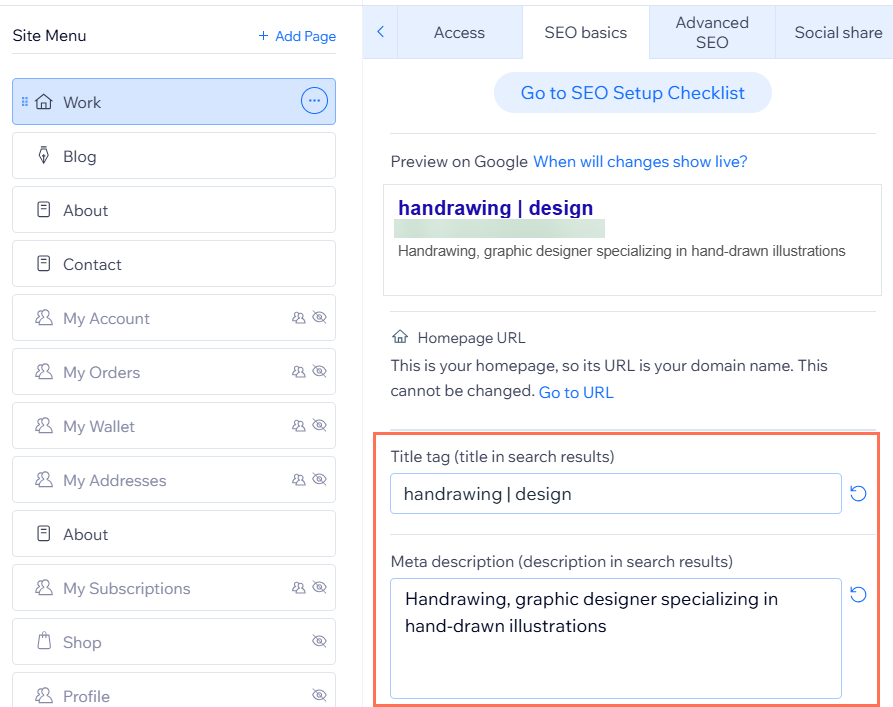Adding SEO Title Tags and Meta Descriptions to Your Pages
6 min
In this article
- Understanding title tags
- Understanding meta descriptions
- Adding title tags and meta descriptions to your pages
- FAQs
Meta tags are snippets of text that describe your page’s content. Meta tags are not visible on the page itself. They appear in the page's code and tell search engines how to display the page in search results.
Search engines usually use your page's title tag and meta description for its search result. Optimizing these two meta tags can help search engines display the most accurate information for your pages.
Important:
Search engines may sometimes use other content on your page if they decide that it's a better match for a search query.
Understanding title tags
Your page's title tag is the title that search engines usually display for your page in search results. For example, your title tag may appear below your page's URL in Google search results.

A clear title tag in search results helps potential site visitors decide whether or not to visit your site. Your page's title tag should be clear and concise with a focus on your page’s target keywords. It's also a good idea to include the name of your business or site in the title tag.
Here are some more tips for writing effective title tags:
- Make each page's title tag unique. This helps your site visitors and search engines differentiate between the pages of your site.
- Make the length of your title tag less than 60 characters. Search engines often trim title tags that are longer than this.
- Use the pipe sign | to distinguish different parts of your title.
- If you own a local business, we recommend using the following format: Keyword | Location | Brand Name. Including the location can help search engines know to display your site to searchers in your area. An example of this is: "Nature Photography | Seattle | Daniel Forest".
- If you do not have a local business, use the following format: Keyword | Brand Name.
An example of this is: "Nature Photography | Daniel Forest". - You can also add symbols and emojis to your page's title tag.
Want to learn more about writing title tags?
Check out our video about writing great title tags in the Wix SEO Learning Hub.
Understanding meta descriptions
Your page's meta description is the description that search engines usually display for your page in search results. For example, it's the description that displays below your page's title tag in Google search results.

Your page's meta description gives your potential site visitors a summary of what your page is about before they visit it. You should make each page's meta description unique to help your site visitors decide if your page contains what they're looking for.
Here are some more tips for writing effective meta descriptions:
- Make your meta description between 50-160 characters long so that it displays correctly in search results. For example, Google usually trims meta descriptions at around 160 characters.
- Use your target keywords in the meta description. For example, here is a meta description for a nature photography business: "Explore Daniel Forest’s breathtaking shots of Seattle’s mountain views and winter wildlife".
- Add a call to action to your description. For example, "Learn how to take your own beautiful photographs of the world around you".
- You can also add symbols and emojis to your page's meta description.
Want to learn more about writing meta descriptions?
Check out our article about writing great meta descriptions in the Wix SEO Learning Hub.
Adding title tags and meta descriptions to your pages
You can add a title tag and meta description to a page in your site's SEO panel.
To add a title tag and meta description:
Wix Editor
Studio Editor
Wix Harmony Editor
- Go to your editor.
- Click Pages & Menu
 on the left side of the editor.
on the left side of the editor. - Click the More Actions icon
 next to the relevant page.
next to the relevant page. - Click SEO basics.
- Enter your title tag under Title tag (title in search results).
- Enter your meta description under Meta description (description in search results).
- Click Publish at the top right of the editor.

Important:
Search engines will update your page's title tag and meta description the next time that they crawl your site. If you want to try to speed up the process, you can submit your page's URL to search engines.
FAQs
Click a question below to learn more about adding SEO title tags and meta descriptions to your pages.
Is there another way I can improve my site’s titles and descriptions for SEO?
How can I get ideas for my title tags and meta descriptions?
Why does Google sometimes show a different meta description than the one I wrote?
Can I add title tags and meta descriptions to pages other than my homepage?


